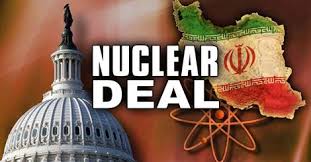Alwaght- The Iranian resistance has stood for the past four decades, during which 13 years of demanding negotiations have concluded in a nuclear agreement in Vienna, followed by lifting the unfairly imposed sanctions against the Islamic republic of Iran. Tehran has turned the threats to precious opportunities which have put the nation in the circle of scientifically developed countries, not to mention the country's entering in scientific fields not accessed so far by many of the developed countries.
The sanctions relief would mean Iran’s access to the global markets, as in return, companies from large industrial countries would invest in Iran, an issue which would improve the Iranian economic conditions. On the other side, however, the US and the Israeli regime are concerned that the Iranian economic flourishing would allow it to support the resistant movements in the region. In this event, would the US stand indifferent? How would Iran respond to Washington?
Looking at the recent developments within a year, as well as remembering the US’ formerly tested behaviors for example in the Iraqi-Iranian war of the 1980s or in Libya and Iraq, we can see obviously the American duality of behavior, the examples of which are:
First, The US would not hesitate breaking its promises and agreements that it signs as part of its efforts to realize its goals. Once it fails to achieve its objectives through dialogue, it is not unlikely for it to use the military choices under vacuous pretexts exactly as the case was in Iraq when Washington claimed that Baghdad was developing WMDs, however, after destroying the country, looting its oil and shedding the Iraqis’ bloods, it became clear that there were no weapons of mass destruction stockpiled in Iraq.
Second, the US believes in both the soft and concrete wars. If it is unable to wage a military confrontation, as it is the case with Iran, it would resort to the soft invasion methods and penetrations about which Iran’s Supreme Leader Ayatollah Sayyed Ali Khamenei has talked recently during his meeting with the Muslim countries’ ambassadors to Iran. He said that the Americans were seeking to impose their own demands and not to settle the problems. They try to achieve % 60 to %70 of their demands through negotiations and for the rest of their objectives, they use illegal pathways.
Third, the policy of blackmailing is considered as one of the most outstanding ways Washington relies on to actualize its objectives. But the successful blackmailing experience would not mean the US would back down from its harassment of the targeted country. To give one example out of unlimited examples, Washington has blackmailed Syria in to destroying Damascus’ chemical weapons, however, even after its demands were met, the US has not ceased backing the armed groups trying to topple the Syrian President Bashar al-Assad.
Here we reach an essential conclusion which asserts that Washington is resolved to confront Tehran using all of the available means, because the problem is not the nuclear program and Iran is not the only country in the region which has nuclear program. Pakistan, India and the Israeli regime are also nuclear states. The problem is, for the US, with the very existence of the Iranian government.
And about the post-sanctions era between the two countries, it is unlikely that Washington and Tehran would resort to fresh negotiations in the present time because “there is no need and it makes no sense to talk to the US about the regional issues because the US is seen as part of the problem and not the solution, as it stands behind all of the chaos the region is observing, and the Islamic Republic of Iran’s goals are different from the US’ goals by 180 degrees, said the Islamic Revolution’s leader Ayatollah Khamenei.
The nuclear deal implementation does not mean that there would not be new clash between the two sides especially that Washington has prepared the ground for raising a series of charges and cases, including the Islamic Republic’s missile program and its backing of the resistant movements in the region, against Tehran exactly while the nuclear deal appeared to be close to its conclusion. The US Department of the Treasury has imposed on Tehran new sanctions concerning its ballistic missiles program, less than 24 hours after lifting the nuclear sanctions.
It seems that the first day of the “new chapter” is distinctly hazy, but this is the start of the story between the two countries and the US would tighten its sanctions on Iran as the time goes by. Iran, by contrast, would not give in its missile rights, as its nuclear program experience proved. Actually, even if the ballistic missiles case is settled, the US would impose new sanctions under the excuse of Tehran’s support for the resistant movements in the region, or for other excuses, and the story keeps rolling on.



























